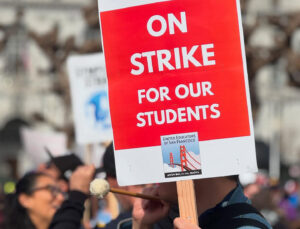The U.S. is confronting the rise of white supremacy, disinformation, and extreme threats to democracy — while a global pandemic has created the worst health and economic emergency of our time. How can educators cultivate the informed, engaged, and effective citizenry we desperately need to ensure the strengthening of a socially just democracy? Research shows that teaching controversial issues leads to students’ increased political knowledge, interest and engagement, but for a range of reasons educators often avoid it.
Events this week were a reminder of the controversial issues that teachers and students could take on, but often don’t. The Israeli-Palestinian conflict took another deadly turn, Republican leaders blocked efforts to set up bipartisan commission to look into the Jan. 6 invasion of the Capitol, and the U.S. Supreme Court took on a case that could further erode a woman’s right to an abortion.
Hosted by Louis Freedberg, we devote this week’s podcast to this critically important issue. Our guests are:
- Pedro Noguera, Dean of the USC Rossier School of Education, who authored a recent essay in Newsweek on “Tolerance doesn’t mean avoiding the ‘ugly’ side of U.S. history.”
- Judy Pace, professor of education at the University of San Francisco, and author of Hard Questions: Learning to Teach Controversial Issues (Rowman & Littlefield, 2021). Check out Pace’s summary of key elements for effective teaching of controversial issues here. Her work is supported by the Spencer Foundation.
Going Deeper:
- Educating for American Democracy: Excellence in History and Civics for All Learners,” iCivics, March 2, 2021.
- Educating for Civic Reasoning and Discourse, National Academy of Education, May 2021.
- The Political Classroom: Evidence and Ethics in Democratic Education, Diana Hess & Paula McAvoy, 2016.
Resources for Educators









